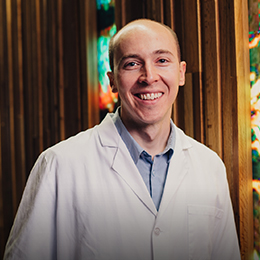Ethan Buhr
 Why did you choose Northwestern?
Why did you choose Northwestern?
Northwestern has great biology graduate programs and departments. The level of camaraderie and professional output of the Neurobiology and Physiology Department was really impressive. I was also interested to work with Joseph Takahashi.
How would you describe your research and/or work to a non-academic audience? What was it then and/or what it is now?
I study circadian rhythms at the molecular and behavioral levels. We seek to find ways in which circadian clocks throughout our bodies become synchronous with each other. This work has also led to studies on the role of light on non-visual physiology throughout the body.
Tell us who or what inspired your research and/or work.
Joseph Takahashi was a big inspiration, and it was exciting to do my graduate projects in his lab at Northwestern. I became interested in biologic rhythms as an undergraduate student while measuring the activity/rest cycles of rodents. At that time the world of molecular biology and genetics was beginning to show that circadian clocks were present in most cells, and they influenced much more than the time we feel sleepy.
What are you most proud of in your career to date?
I am most proud of identifying a role of a novel opsin protein, OPN5, in regulating the light response of circadian clocks outside of the canonical light-response pathway. It identifies a mechanism by which circadian clocks on the surface of mammals can directly detect environmental light.
Tell us about a current achievement or something you're working on that excites you.
Recently we identified surface tissues which are typically unresponsive to light, which become responsive after injury. The eye's cornea is an example of a tissue which does not express photoreceptor cells in a normal state, but after injury (keratoplasty or refractive surgery) a group of photosensitive cells is induced along the cornea's surface.
What advice would you give your younger self or someone considering a similar path?
I would tell myself to let the data guide the next scientific project. On the one hand, it is fulfilling to study something that you have always been interested in. This needs to be balanced with allowing the data collected to inform you what the next fruitful avenue will be, even if it is something you previously found uninteresting.